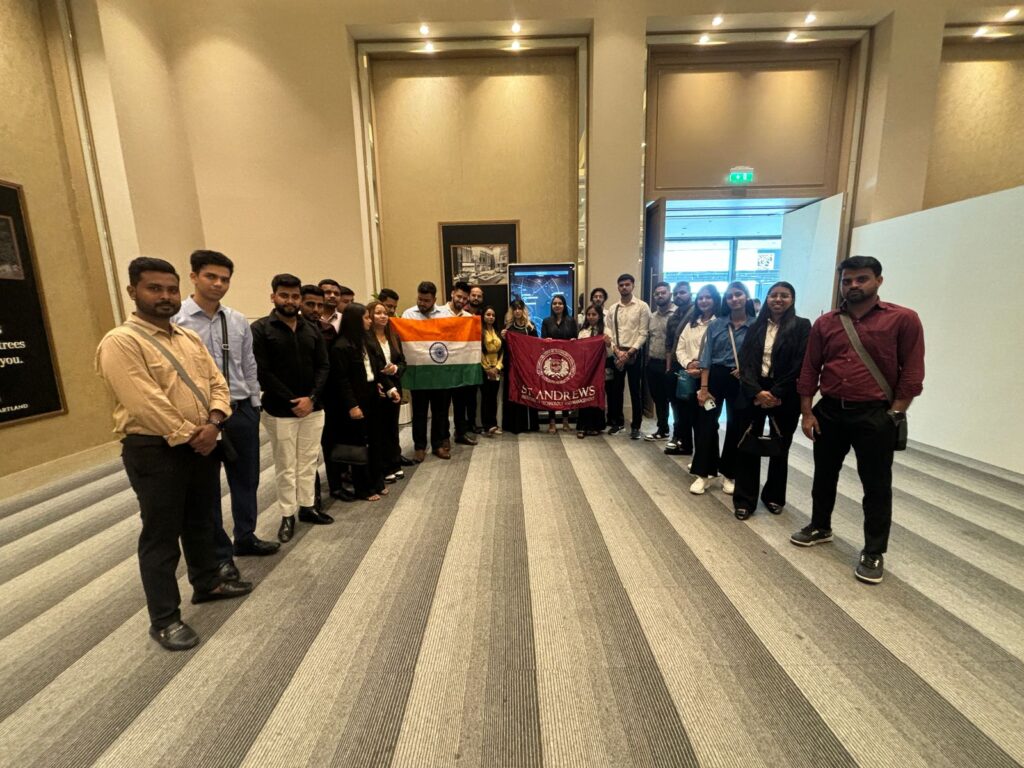D Pharma Kya Hai
Diploma in Pharmacy, commonly known as D. Pharma, is a two-year diploma program tailored for students aspiring to build a career in pharmaceutical education and the industry. If you’re wondering, D Pharma Kya Hai, it is a course that imparts essential knowledge of pharmacy, covering medication preparation, dispensing, and safe usage. Additionally, it provides insights into the science behind pharmaceuticals, equipping students with a strong foundation for various roles in the field.
Key Aspects of Diploma in Pharmacy:
Course Duration: Typically, D. Pharma is a two-year program divided into four semesters.
Eligibility: Students who have completed their 10+2 education with a focus on science subjects (Physics, Chemistry, and Biology/Mathematics) are eligible to apply.
Curriculum: The curriculum covers subjects such as Pharmaceutical Chemistry, Pharmacology, Pharmacognosy, Hospital and Clinical Pharmacy, and Pharmacy Law and Ethics.
Career Opportunities: After completing this program, “D Pharma Kya Hai” – graduates can work as pharmacists in hospitals, clinics, or retail pharmacies. They may also choose to pursue further studies, such as a B. Pharma (Bachelor of Pharmacy), to qualify for more advanced roles. This course provides essential training and prepares students for various roles in pharmaceutical care.
Licensing: Graduates are eligible to register as pharmacists and practice in various healthcare settings after obtaining the necessary licenses.
Some of the most opted courses in India and St. Andrews college or different Engineering college or Management colleges are as follows:-
- Btech
- Btech CSE
- MTech
- Btech ETCE
- BCA
- BBA
- MBA
- MCA
- DPharma – St. Andrews College of Pharmacy
- BPharma – St. Andrews College of Pharmacy
- BArch – St. Andrews College of Architecture
Eligibility Criteria for D Pharma
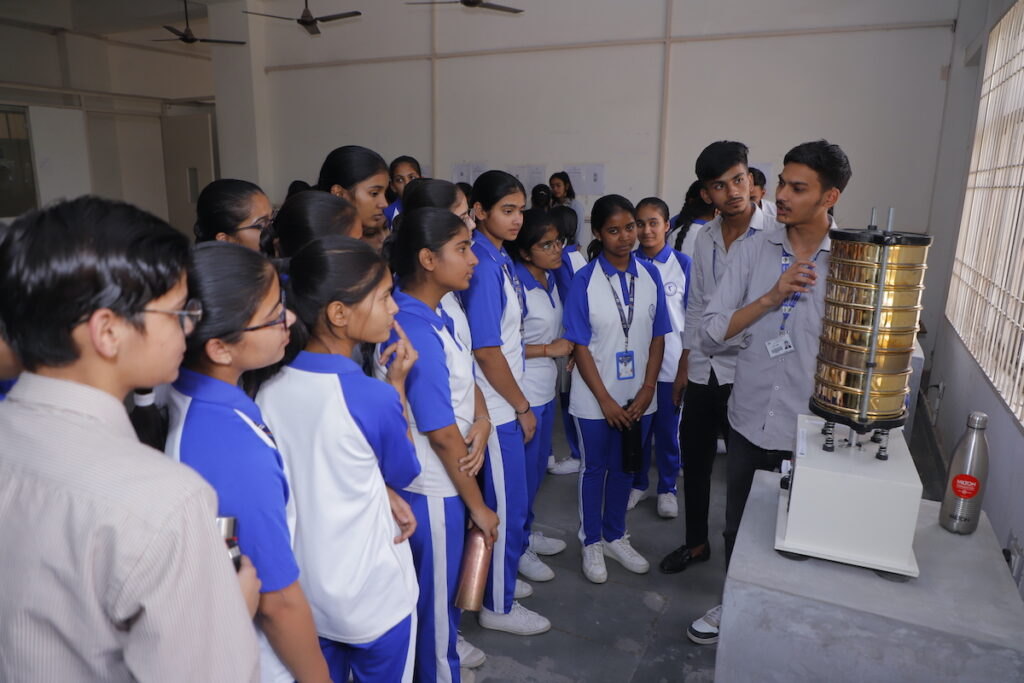
The eligibility criteria for a Diploma in Pharmacy (D. Pharma) typically include the following:
Educational Qualification:
The candidate must have completed their 10+2 (or equivalent) from a recognized board.
The candidate should have studied Physics, Chemistry, and either Biology or Mathematics as compulsory subjects.
Minimum Marks:
Candidates must have secured a minimum of 50% marks in their 10+2 examination (this percentage may vary slightly depending on the institution).
Age Limit:
The candidate should be at least 17 years old at the time of admission. Some institutions might have specific age criteria, so it’s important to check with the college.
Entrance Exam:
Some institutions or states may require candidates to appear for an entrance exam for admission to the D. Pharma course. The entrance exams can be state-level or specific to the institution.
The course includes comprehensive pharmaceutical training to ensure practical knowledge and skills.
Admission Process for D Pharma
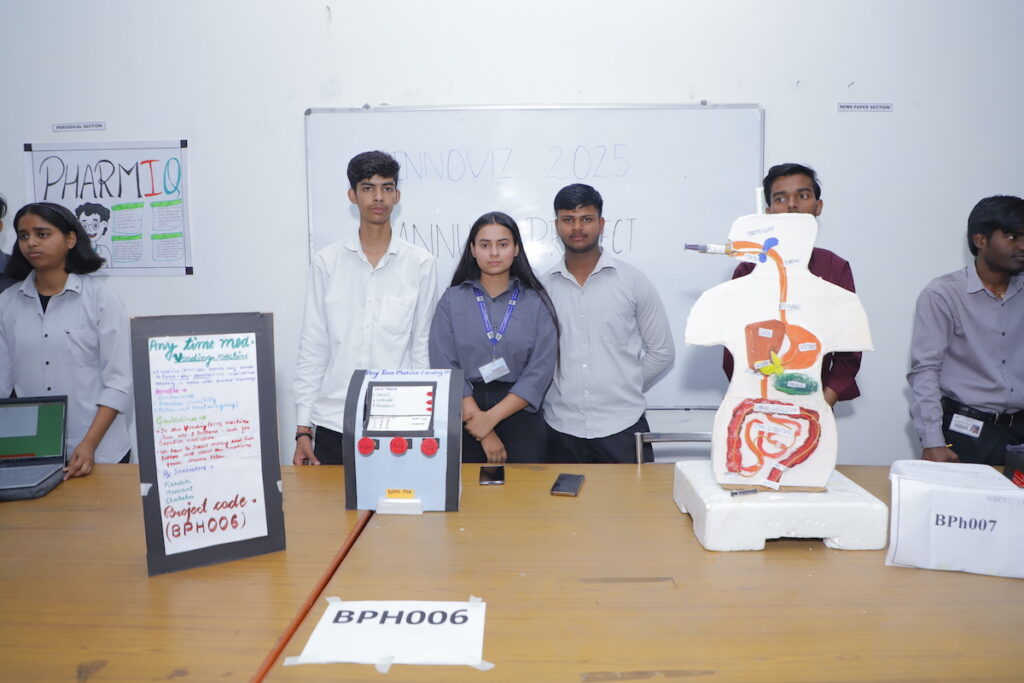
The admission process for a Diploma in Pharmacy (D. Pharma) generally involves the following steps:
Meeting Eligibility Criteria:
Ensure that you meet the eligibility criteria, including educational qualifications in pharmaceutical education, minimum marks, and age requirements.
Application Form:
Obtain and fill out the application form for the D. Pharma course. You can typically do this online through the college’s official website or offline by visiting the college in person.
Provide the necessary documents, such as academic transcripts, identification proof, and passport-sized photographs.
Entrance Exam (if applicable):
Some institutions or states may require you to appear for an entrance exam specific to D. Pharma admissions.
Prepare for the entrance exam, which usually tests your knowledge in subjects like Physics, Chemistry, Biology, and Mathematics.
After the exam, wait for the results and cutoff lists.
Merit List:
If the college does not require an entrance exam, admissions are typically based on the marks obtained in your 10+2 examination.
The college will release a merit list based on these marks or entrance exam scores.
Check the merit list to see if you have been selected.
Counseling (if applicable):
Some institutions may conduct a counseling session for selected candidates. This is where you can choose your preferred college and secure your seat.
During counseling, you may need to submit original documents for verification.
Payment of Fees:
Once selected, you will need to pay the admission fees to confirm your seat in the D. Pharma program.
Payment details will be provided by the institution.
Document Verification:
Submit all required documents for verification, including your 10+2 mark sheet, entrance exam scorecard (if applicable), birth certificate, and other relevant certificates.
Final Admission:
After completing the above steps, you will receive an official admission letter from the college.
Attend the orientation session and start your classes as per the academic calendar.
Fees Structure for D Pharmacy Course

The fee structure for a Diploma in Pharmacy (D. Pharma) course can vary widely based on factors such as the type of institution (government or private), location, and additional considerations. “D Pharma Kya Hai” – understanding this diploma program’s framework can aid in evaluating fee expectations accurately.
Here’s a general overview:
Government Colleges:
Annual Fees: ₹5,000 to ₹25,000
Total Course Fees: ₹10,000 to ₹50,000 for the entire 2-year program
Private Colleges:
Annual Fees: ₹50,000 to ₹1,50,000
Total Course Fees: ₹1,00,000 to ₹3,00,000 for the entire 2-year program
Additional Costs:
Examination Fees: ₹1,000 to ₹5,000 per semester or year
Lab Fees: ₹5,000 to ₹10,000 per year (depending on the college)
Books and Supplies: ₹5,000 to ₹10,000 per year
Miscellaneous Fees: This may include charges for uniforms, library, extracurricular activities, and other facilities, typically ranging from ₹2,000 to ₹10,000 per year.
Scholarships and Financial Aid:
Many colleges offer scholarships or financial aid based on merit, economic background, or other criteria, which can reduce the overall cost of the course.
Government scholarships are also available for students from economically weaker sections, reserved categories, or those with high academic performance.
State-wise Variation:
The fees can also vary depending on the state. For example, states with a higher concentration of pharmaceutical colleges might have lower fees due to competition, while others might be more expensive.
The fees cover comprehensive pharmaceutical education, ensuring students receive a well-rounded and thorough understanding of the field.
D Pharma Course Details

The Diploma in Pharmacy (D. Pharma) is a short-term course designed to introduce students to the fundamentals of pharmaceutical sciences.
Here’s a detailed overview of the D. Pharma course:
Course Overview:
- Duration: 2 years
- Type: Diploma
- Field of Study: Pharmacy, Healthcare
The course prepares students for roles in pharmaceutical care.
- Eligibility: 10+2 with Physics, Chemistry, and Biology/Mathematics
Course Structure:
The D. Pharma course curriculum is typically divided into two academic years, each consisting of theoretical and practical subjects. The pharma syllabus is designed to provide a solid foundation in various aspects of pharmacy.
Year 1 Subjects:
- Pharmaceutics I: Introduction to the basics of drug formulation, compounding, and the physical properties of drugs. This subject includes practical pharmaceutical training to provide hands-on experience in the field.
- Pharmaceutical Chemistry I: Study of the chemical properties of drugs and their interactions.
- Pharmacognosy: Understanding the medicinal properties of natural substances obtained from plants, animals, and minerals.
- Biochemistry & Clinical Pathology: Basics of biochemistry related to human physiology and the role of clinical pathology in diagnostics.
- Human Anatomy & Physiology: Detailed study of human body systems, their functions, and their relevance in pharmacy.
- Health Education & Community Pharmacy: Overview of public health, hygiene, and the role of pharmacists in community healthcare.
Year 2 Subjects:
- Pharmaceutics II: Advanced topics in drug formulation and pharmaceutical technology.
- Pharmaceutical Chemistry II: Continuation of pharmaceutical chemistry with a focus on complex drug molecules.
- Pharmacology & Toxicology: Study of the effects of drugs on biological systems and the toxic effects of chemical substances.
- Pharmaceutical Jurisprudence: Introduction to the laws and regulations governing the practice of pharmacy.
- Drug Store & Business Management: Basics of managing a pharmacy, including inventory control, accounting, and marketing.
- Hospital & Clinical Pharmacy: Role of pharmacists in hospital settings, including patient care, drug dispensing, and clinical management. This subject prepares students for roles in pharmaceutical care.
Practical Training:
Students are required to complete pharmaceutical training sessions in labs, where they learn to prepare and dispense medicines, handle pharmaceutical equipment, and understand the practical aspects of pharmacy.
In the final year, students may also have to undergo a compulsory internship or practical training in a hospital or pharmacy to gain hands-on experience.
Examinations and Assessment:
- The course includes periodic assessments through written exams, practical exams, and internal evaluations.
- To successfully complete the course, students must pass both the theoretical and practical components.
Career Opportunities:
After completing a Diploma in Pharmacy (D. Pharma), several career opportunities are available in pharmaceutical companies and many more as discussed below:
- Community Pharmacist: Dispense medications and counsel patients on their use. The role also involves providing pharmaceutical care.
- Hospital Pharmacist: Work in hospitals to manage drug therapies for patients.
- Medical Representative: Promote pharmaceutical products to healthcare professionals.
- Pharmaceutical Sales: Work in the marketing and sales of pharmaceutical products.
- Regulatory Affairs: Ensure that products comply with all regulations before they reach the market.
Further Studies:
- Bachelor of Pharmacy (B. Pharm): A 4-year undergraduate course for those looking to further their education in pharmacy. It provides advanced pharmaceutical education.
- Specializations: After B. Pharm, students can pursue M. Pharm or Ph.D. in specialized fields like Pharmacology, Pharmaceutics, Pharmaceutical Chemistry, etc.
Key Skills Developed:
- Analytical Skills: For drug formulation and quality control.
- Attention to Detail: Critical for accurately dispensing medications.
- Communication Skills: Essential for patient counseling and professional interactions.
- Ethical Responsibility: Understanding the legal and ethical responsibilities of a pharmacist.
Entrance Exams for D Pharmacy Course

Entrance exams for D.Pharm (Diploma in Pharmacy) courses, which are crucial for pharmaceutical education, may vary depending on the institution and region.
Here are some common entrance exams and admission processes for D.Pharma programs:
- State-Level Entrance Exams:
- Maharashtra: Maharashtra State Common Entrance Test (MHT CET) may be considered for some pharmacy colleges.
- Karnataka: Karnataka Common Entrance Test (KCET) is used by some institutions.
- Institution-Specific Entrance Exams:
- Some colleges conduct their own entrance exams to assess candidates’ suitability for the D.Pharm program. These exams typically test subjects related to science, such as Physics, Chemistry, and Biology.
- Direct Admission:
- Many institutions admit students based on their 10+2 examination scores without requiring an entrance exam. Eligibility criteria and admission processes can vary.
- Other State or National Exams:
- Certain states or institutions may have specific exams or procedures, so it’s essential to check the requirements of the particular college or university you are interested in.
General Admission Process:
- Application: Submit an application form either through the institution’s website or in person.
- Entrance Exam (if applicable): Take the entrance exam if required.
- Interview/ Counseling (if applicable): Some institutions may have a counseling session or interview as part of the admission process.
- Document Verification: Provide necessary documents such as 10+2 marksheets, ID proof, and passport-sized photographs.
Top Colleges for D Pharma
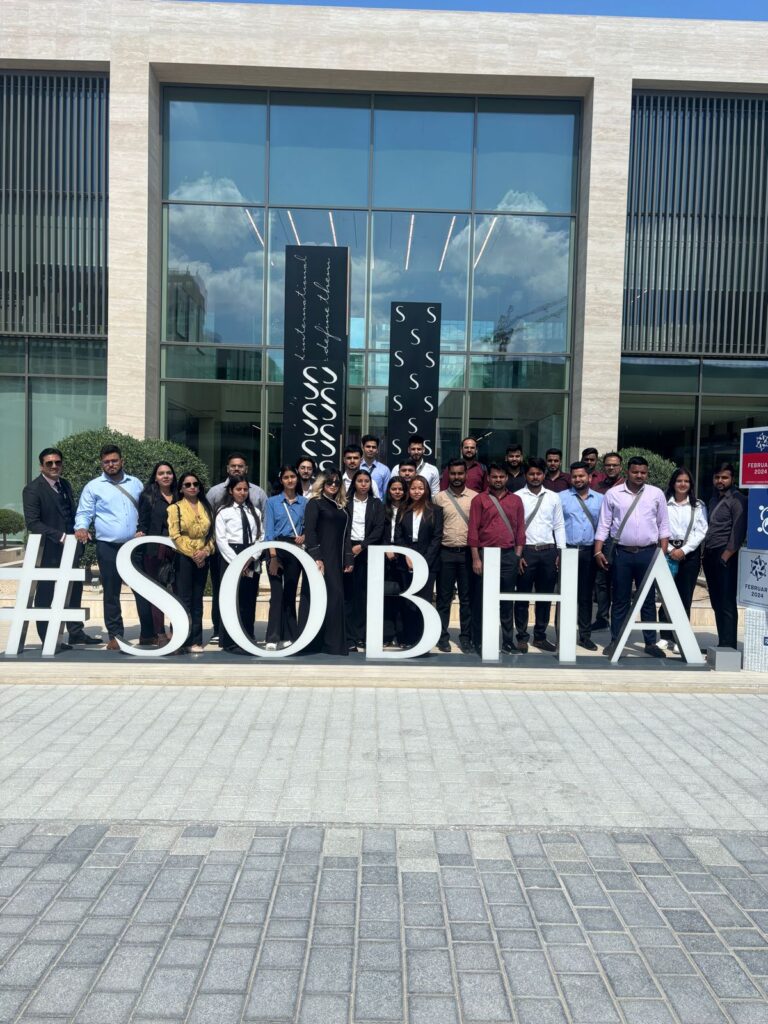
Here’s a list of top pharmacy colleges among different pharmacy college in India offering the Diploma in Pharmacy (D. Pharma) course:
St. Andrews College of Pharmacy (SACP)
- Location: Gurgaon, Haryana
- Highlights: SACP is one of the best educational institutes that provides a comprehensive D. Pharma course with modern facilities and strong industry connections.
Delhi Institute of Pharmaceutical Sciences and Research (DIPSAR)
- Location: Delhi
- Highlights: Delhi Institute of Pharmaceutical Sciences and Research University is known for its high-quality education and cutting-edge research in pharmacy and pharmacy laws. The institution provides comprehensive pharmaceutical training.
Jamia Hamdard University
- Location: Delhi
- Highlights: Offers a thorough D. Pharma program with a focus on practical training and research excellence.
Bangalore College of Pharmacy
- Location: Bangalore, Karnataka
- Highlights: Distinguished for its excellent infrastructure and industry-oriented curriculum.
JSS College of Pharmacy
- Location: Mysore, Karnataka
- Highlights: Offers well-structured D. Pharma courses with a strong emphasis on practical experience.
Government College of Pharmacy
- Location: Bangalore, Karnataka
- Highlights: Provides a solid foundation in pharmacy education with experienced faculty and good facilities.
Benefits of Pursuing D Pharma

Pursuing a Diploma in Pharmacy (D. Pharma) offers several benefits:
Foundational Knowledge: D. Pharma offers a solid grounding in pharmaceutical science, covering drug formulation, dispensation, and fundamental medical knowledge, which are crucial for comprehending drug interactions, side effects, and therapeutic applications. This core understanding is what “D Pharma Kya Hai” encapsulates, preparing students for various roles in the pharmacy sector.
Career Opportunities: It opens up diverse career paths in the pharmaceutical industry, including roles such as pharmacy assistant, retail pharmacist, hospital pharmacist, and sales representative. There’s also potential for further specialization in fields like clinical research or drug development. Additionally, the course prepares students for roles in pharmaceutical care, ensuring they are well-equipped to provide patient-centered services.
Shorter Duration: Compared to a Bachelor of Pharmacy (B. Pharma), the D. Pharma program typically takes less time to complete, usually around 2 years. This allows you to enter the workforce sooner.
Affordable Education: D. Pharma programs are generally more affordable than B. Pharma programs, making it a cost-effective option for those interested in the field of pharmacy.
Practical Experience: The curriculum often includes practical training and internships, providing hands-on experience in real-world settings. This is crucial for developing practical skills and understanding the day-to-day responsibilities of a pharmacist.
Regulatory Compliance: Graduates are trained to understand and adhere to the regulations and standards governing pharmaceutical practices, ensuring that they can work effectively and legally within the industry.
Entrepreneurial Opportunities: The knowledge acquired in the “D Pharma Kya Hai” program enables graduates to pursue entrepreneurial ventures, such as opening their own pharmacies or launching businesses focused on healthcare products.
D Pharmacy vs B Pharmacy

D. Pharma (Diploma in Pharmacy) vs. B. Pharma (Bachelor of Pharmacy)
Duration and Level
- D Pharmacy: Typically a 2-year diploma course that provides foundational knowledge in pharmaceutical education. It’s designed for those looking to enter the workforce quickly.
- B. Pharma: A 4-year undergraduate degree program that offers in-depth knowledge and a broader scope in pharmaceutical sciences.
Curriculum and Depth
- D Pharmacy: The course focuses on essential pharmacy principles, including drug formulation, dispensation, and foundational medical knowledge. “D Pharma Kya Hai” – it’s a diploma program offering practical training but is less extensive than a full degree program. This curriculum prepares students for roles in pharmaceutical care and equips them with the necessary skills to enter the healthcare sector with confidence.
- B. Pharma: Covers advanced topics in pharmaceutical science, including pharmacology, pharmaceutical chemistry, drug delivery systems, and clinical pharmacy. It includes a deeper exploration of the field and more extensive practical training.
Career Opportunities
- D Pharmacy: Prepares graduates for roles such as pharmacy assistants, retail pharmacists, and basic pharmaceutical sales roles. It is often considered an entry-level qualification. The course also prepares students for roles in pharmaceutical care.
- B. Pharm: Opens up more advanced career opportunities such as a clinical pharmacist working in clinical pharmacy, pharmaceutical researchers, quality control managers, and roles in regulatory affairs. It also offers better prospects for specialization and higher positions in the industry.
Further Education
- D. Pharma: While it provides a good foundation, further education typically requires pursuing a B. Pharma or equivalent for advanced roles or specializations. It provides a foundation for advanced pharmaceutical education.
- B. Pharm: Provides a solid basis for further studies such as M. Pharma (Master of Pharmacy), MBA in Pharmaceutical Management, or even Ph.D. in pharmaceutical sciences.
Employment and Salary
- D. Pharma: Generally leads to entry-level positions with comparatively lower salaries. It’s often seen as a starting point in the pharmacy profession.
- B. Pharma: Typically results in higher starting salaries and better long-term career prospects. The degree is often required for advanced positions and specialized roles in the pharmaceutical industry.
Cost and Duration
- D. Pharma: Usually less expensive and shorter in duration, making it a quicker path into the workforce.
- B. Pharma: More costly and time-consuming but offers a more comprehensive education and better career opportunities.
Recognition and Scope
- D. Pharma: Widely recognized as a basic qualification for pharmacy practice but may have limitations in terms of career advancement.
- B. Pharma: Recognized as a higher qualification in pharmacy practice that opens doors to a wider range of professional and research opportunities in the pharmaceutical field.
Career Opportunities after D Pharma
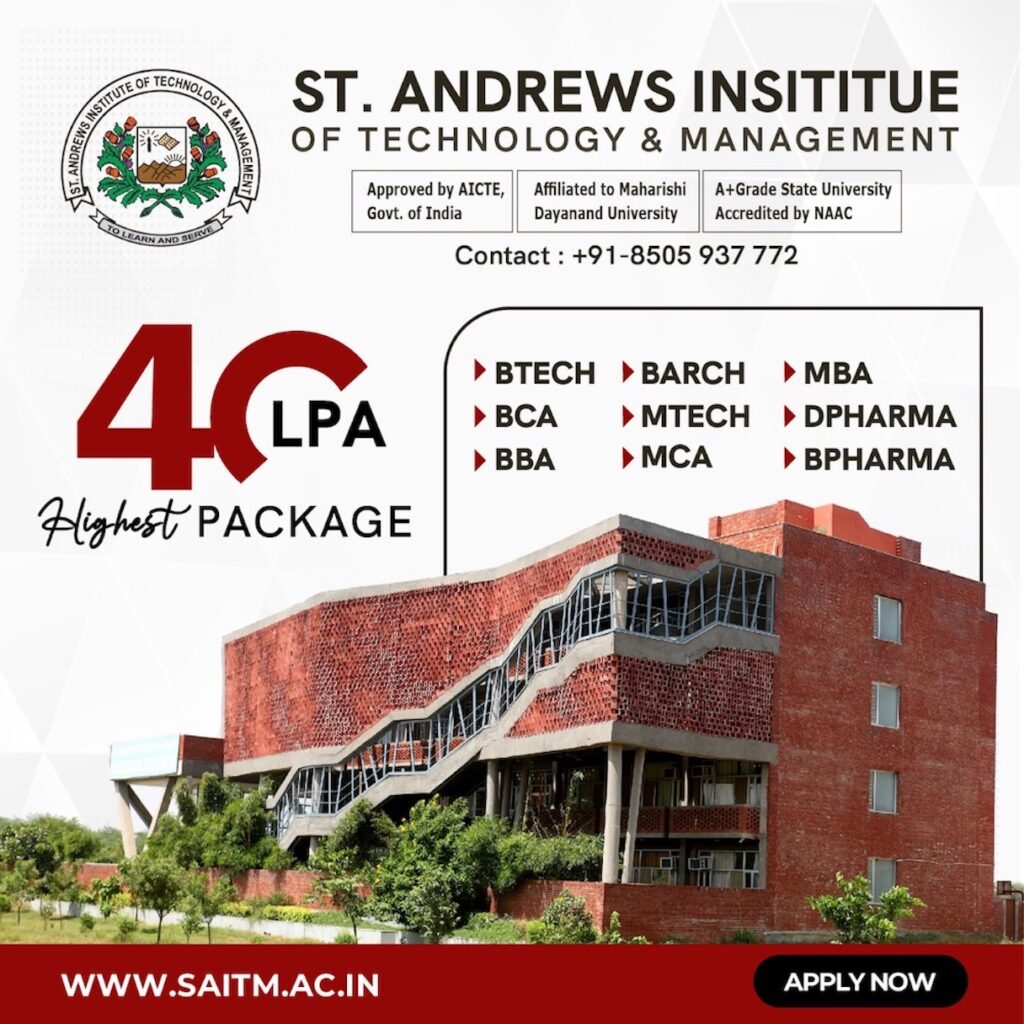
After completing a Diploma in Pharmacy (D. Pharma), several career opportunities are available in pharmaceutical companies and many more as discussed below:
Retail Pharmacist: Work in retail pharmacies to dispense medications, provide patient counseling, and manage inventory.
Hospital Pharmacist: Assist in hospitals or clinics by preparing and dispensing medications, consulting with healthcare professionals, and monitoring patient therapies.
Pharmacy Assistant: Support pharmacists by managing stock, processing prescriptions, and handling customer inquiries.
Pharmaceutical Sales Representative: Promote and sell pharmaceutical products to healthcare professionals and institutions, often involving travel and client interaction.
Medical Store Manager: Oversee operations in a medical store or pharmacy, including staff management, inventory control, and customer service.
Quality Control Assistant: Work in pharmaceutical manufacturing units to ensure that products meet quality standards through testing and inspection.
Pharmacy Technicians: Assist pharmacists with technical tasks, such as preparing prescriptions and managing pharmaceutical supplies.
Community Health Worker: Provide health education and basic pharmaceutical care in community settings, often working with public health organizations.
Pharmaceutical Distribution: Involve in the distribution and supply chain of pharmaceutical products, ensuring timely and accurate delivery to pharmacies and healthcare facilities.
Further Specialization: Pursue additional certifications or qualifications to specialize in areas like clinical research, regulatory affairs, or drug safety.
Entrepreneurship: Start your own pharmacy or medical supply business, leveraging your knowledge and skills to cater to local healthcare needs.
Average Salary Expected After D Pharmacy course
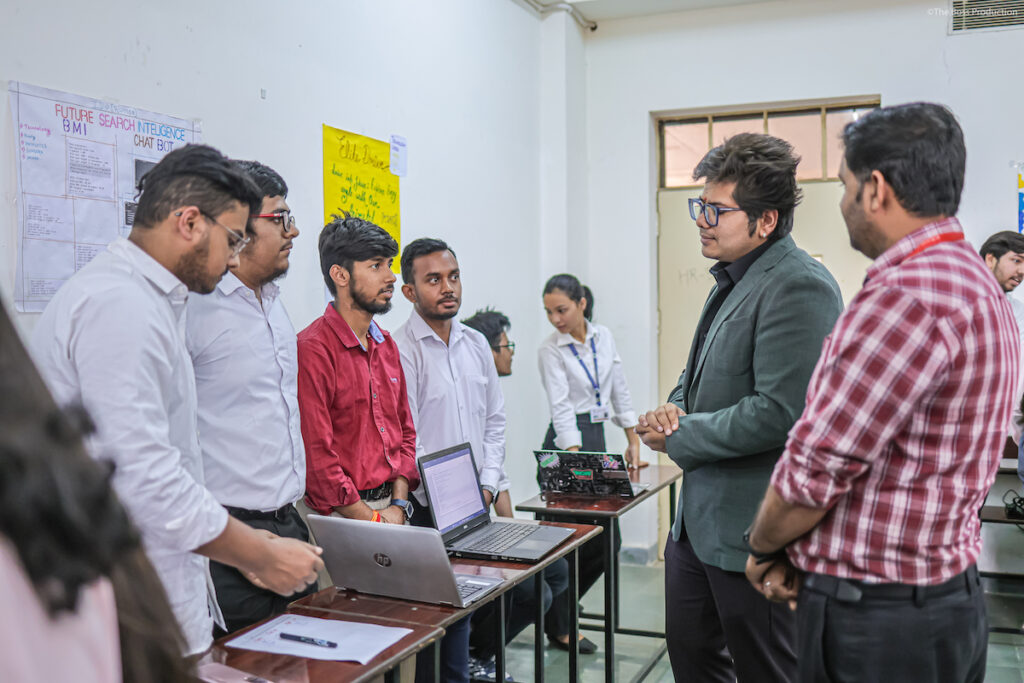
The average salary for a Diploma in Pharmacy (D. Pharma) graduate can vary depending on the job role, location, and level of experience.
Here’s a general overview of D Pharma salary in India:
- Retail Pharmacist: ₹2.5 – ₹4 lakhs per annum
- Hospital Pharmacist: ₹3 – ₹5 lakhs per annum
- Pharmacy Assistant: ₹1.8 – ₹3 lakhs per annum
- Pharmaceutical Sales Representative: ₹2.5 – ₹4.5 lakhs per annum
- Medical Store Manager: ₹3 – ₹5 lakhs per annum
- Quality Control Assistant: ₹2.5 – ₹4 lakhs per annum
- Pharmacy Technician: ₹2 – ₹3.5 lakhs per annum
- Community Health Worker: ₹2 – ₹3 lakhs per annum
These salaries reflect the comprehensive pharmaceutical education provided by the course.
FAQs
What is Diploma in Pharmacy?
D.Pharm, also known as “D Pharma Kya Hai,” is a two-year diploma course in pharmacy. This program equips students with essential knowledge and skills in drug formulation, dispensing, and managing pharmacies. It focuses on providing a thorough education in pharmaceuticals, preparing students for various roles within the pharmaceutical industry.
What are the eligibility criteria for Diploma in Pharmacy?
Generally, candidates must have completed their 10+2 education with Physics, Chemistry, and Biology or Mathematics. Some institutions may have additional requirements.
What is the duration of the Diploma in Pharmacy course?
The course typically lasts for two years, which includes theoretical studies and practical practice.
What subjects are covered in the Diploma in Pharmacy curriculum?
The curriculum usually includes subjects such as Pharmaceutical Chemistry, Pharmacology, Pharmacognosy, Pharmaceutical Technology, and more.
Is there any entrance exam for D.Pharm?
Admission processes vary by institution. Some may require entrance exams, while others admit students based on their 10+2 exam results.
What are the career opportunities after completing D.Pharm?
Graduates have various career options: they can work as pharmacists in retail or hospital settings, engage in pharmaceutical sales, or join regulatory agencies. “D Pharma Kya Hai” – this diploma also opens doors for further studies or specialized training, allowing graduates to advance their careers in the pharmaceutical field.
Can D.Pharm graduates open their own pharmacy?
Yes, D.Pharm graduates can open and operate their own pharmacy, subject to obtaining the necessary licenses and registrations as per local regulations.
What is the fee structure for Diploma in Pharmacy courses?
Fees for this program vary by institution, with costs ranging from more affordable options at public colleges to higher fees at private institutions. “D Pharma Kya Hai” – understanding this diploma’s value can help in evaluating options. It’s best to consult specific colleges for detailed and accurate fee information.
Are there any further study options after D.Pharm?
Yes, graduates can pursue higher studies such as a Bachelor of Pharmacy (B.Pharm), Master of Pharmacy (M.Pharm), or specialized certifications.
What skills are important for a successful career in pharmacy?
To understand D Pharma Kya Hai, it’s key to recognize the important skills required: attention to detail, in-depth knowledge of pharmaceuticals, strong communication abilities, and a solid grasp of regulatory and ethical standards in pharmacy practice. These are essential for a successful career in the field.
D फार्मा करने से क्या होता है?
D फार्मा (डिप्लोमा इन फार्मेसी) करने से आप फार्मेसी क्षेत्र में एक प्रमाणित पेशेवर बन जाते हैं। यह पाठ्यक्रम आपको दवाओं, उनके उपयोग और उनके प्रभाव के बारे में गहरी जानकारी प्रदान करता है, जिससे आप फार्मासिस्ट, मेडिकल स्टोर संचालक, या हेल्थकेयर में अन्य संबंधित भूमिकाओं में काम कर सकते हैं।
डी फार्मा करने के बाद कौन सी नौकरी मिल सकती है?
डी फार्मा करने के बाद आप निम्नलिखित नौकरियों में काम कर सकते हैं:
- फार्मासिस्ट: अस्पताल, क्लिनिक या मेडिकल स्टोर में दवाओं की बिक्री और सलाह देने का कार्य।
- मेडिकल स्टोर ऑपरेटर: अपनी खुद की मेडिकल स्टोर खोल सकते हैं या किसी के स्टोर पर काम कर सकते हैं।
- मेडिकल रिप्रेजेंटेटिव: दवा कंपनियों के लिए काम कर सकते हैं, जहां आप डॉक्टरों और अस्पतालों को दवाओं के बारे में जानकारी देते हैं।
- हेल्थकेयर असिस्टेंट: अस्पतालों और क्लीनिकों में चिकित्सा टीम का समर्थन करने का कार्य।
- केमिस्ट: दवा की दुकान पर दवाओं का प्रबंधन और वितरण।
डी फार्मा की सैलरी कितनी होती है?
डी फार्मा (डिप्लोमा इन फार्मेसी) के बाद सैलरी कई कारकों पर निर्भर करती है, जैसे कि कार्य स्थल, अनुभव, और स्थान। सामान्यतः, एक शुरुआती फार्मासिस्ट की सैलरी भारत में लगभग ₹15,000 से ₹25,000 प्रति माह हो सकती है। अधिक अनुभव और विशिष्ट भूमिकाओं में सैलरी अधिक हो सकती है।
विशेष क्षेत्रों या बड़े शहरों में काम करने पर, या प्राइवेट सेक्टर में होने पर, सैलरी और भी बढ़ सकती है।
डी फार्मा की 2 साल की फीस कितनी होती है?
डी फार्मा (डिप्लोमा इन फार्मेसी) की 2 साल की फीस कॉलेज और उसके स्थान के आधार पर अलग-अलग होती है। सामान्यतः सरकारी कॉलेजों में फीस ₹10,000 से ₹50,000 प्रति वर्ष के बीच होती है, जबकि प्राइवेट कॉलेजों में यह ₹50,000 से ₹2 लाख प्रति वर्ष तक हो सकती है।
आपके क्षेत्र या इच्छित कॉलेज के अनुसार फीस अलग हो सकती है, इसलिए बेहतर होगा कि आप सीधे कॉलेज से संपर्क करके सटीक जानकारी प्राप्त करें।




